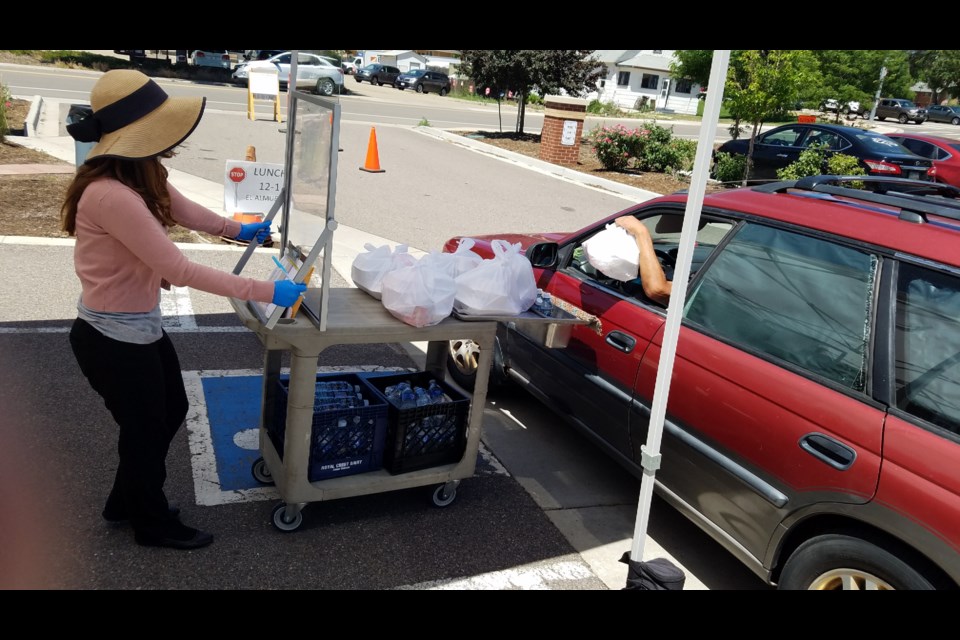The man’s red Subaru wagon was packed tight with clothes, boxes and anything else he could shove into the vehicle. He barely had room for the boxed lunch he received from a volunteer in Longmont’s OUR Center parking lot.
The 57-year-old declined to give his name but said he had been living in his car “for quite a while.” He drives to the OUR Center’s lunch distribution when he can.
He said he can’t find work because COVID-19 shuttered many places that could use him as a laborer. The virus also has made it tougher for him to use public bathrooms where he could wash up before a job interview.
“All the grocery stores, all the convenience stores, won’t let me in now because they have restrictions … I have to wear a mask,” he sadi. “All of this because of this damn hoax. It’s just like a bad flu, but people have lost their minds about it.”
Whether he believes in COVID-19 or not, the reality is it has made the man’s life much harder. He and other homeless and low-income people are staggering because of the blows delivered by COVID-19, according to local advocates of the poor and disadvantaged.
“We have seen more and more people with no place to go,” said Joseph Zanovitch, executive director of Homeless Outreach Providing Encouragement, or HOPE. The organization provides year-round shelter for the homeless in Longmont.
“They’ve lost their jobs and can’t pay their rent or their mortgage and it’s happening at a quicker pace than just a few months ago. They are just beaten down.”
“Worried, depressed, hopeless,” Zanovitch said. “Yeah, we’ve seen a lot of that lately.”
Those walking into HOPE’s shelter are feeling the same pressures exerted nationally by COVID-19.
Adults in lower-income and younger households who suffered job losses during the COVID-19 pandemic have less confidence they can pay the next month’s rent or mortgage on time and suffer more mental anguish and food insecurity.
This is according to an analysis of Household Pulse Survey data released June 19 by the U.S. Census Bureau. Designers of the Household Pulse Survey collect and disseminate data in near real-time to provide insights into how American households are faring during the COVID-19 pandemic.
The survey found that in households with an income of less than $25,000 that experienced lost employment income, half of adults had either “no confidence” or “slight confidence” in their ability to pay the next month’s rent or mortgage on time. That is compared with 8.4% of households with an income of $100,000 or more.
Among respondents ages 25 to 39, 33.7% had either “no confidence” or “slight confidence” in their household’s ability to pay the next months’ rent or mortgage on time, while 12.2% of respondents 65 and older felt the same way, the survey stated.
Among adults living in households where someone experienced losses in employment income, the rate of adults who reported feeling worried, down, depressed or hopeless during the week of June 4-9 was higher for younger and lower-income households, according to the Census Bureau survey.
More worried families are asking the OUR Center for help in finding, clothing, finding a job, paying rent or their bills, said Marc Cowell, executive director.
From April to June, the OUR Center booked 635 appointments for people looking for help. That same period last year, there were about 200, Cowell said.
“We’ve seen a significant increase in people coming in looking for aid, whether it’s for food, clothing or shelter,” he said.
The OUR Center also had to alter its hours to adhere to social-distancing requirements. Prior to COVID-19, people could walk into the facility at 220 Collyer St. during regular business hours and shop for clothes and get a meal.
Since late March, groceries are available once a week via a drive-thru service at the building on a schedule of 9 a.m. to noon Monday, Wednesday, Thursday and Friday. Drive-up service is also available from 1 to 5:30 p.m. Tuesday
Lunch is served via a drive-up service from noon to 1 p.m. daily. All classes and in-person meetings also have been suspended.
Zanovitch said the poor and homeless were hurt even further by stay-at-home requirements because it limited panhandling.
“People on the streets couldn’t get any source of income, even if it was limited to panhandling,” he said. “This pandemic has hurt the poor in so many ways. And it could be a long time for people to come back from this.”



